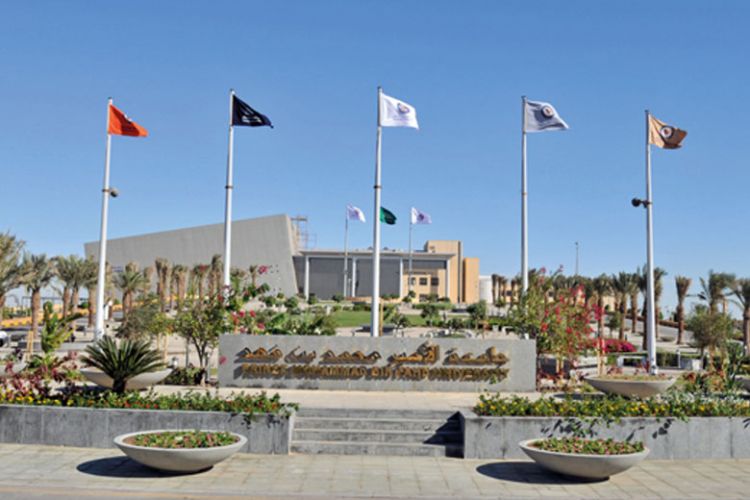Ground-breaking research and lifelong learning in the Middle East

PMU is expanding its research and curricula to give faculty and students the experience and skills they will need for the future
The central ethos of Prince Mohammad Bin Fahd University, a private university in the Eastern Province of Saudi Arabia, is to build global citizens. “We want to prepare our students to be leaders not only in Saudi Arabia but also around the globe,” explains vice-rector for academic affairs, Dr Faisal AlAnezi. Since it was founded in 2006, PMU has committed to diversifying its local and national economies by producing employable graduates, conducting valuable applied research and ensuring that its alumni can share their technical knowledge and interpersonal skills across all other cultures beyond the borders of Saudi Arabia.
This is reflected in its curricula, which aim to imbue students across all academic majors with general education core competencies as well as the discipline-specific skills they will need for entry-level jobs not only into the kingdom’s knowledge-based workplace but also worldwide. These are communication (in English and Arabic), technical, critical thinking and problem solving, professional, teamwork and leadership skills, and conflict resolution. “This prepares students to be leaders in their communities and to be entrepreneurial,” says Dr AlAnezi. “Lifelong learning is also important. We don’t want to just help students to find a job: we want to support them to manage their lives, to be open to other cultures and societies and to practice self-professional development through continuing their education and training.”
Research is central to the university’s global ambitions, both in terms of the potential practical applications and in improving the institution’s national and international visibility and ranking. Dr AlAnezi describes research as “the most fundamental pillar that all universities pursue for the good of nature and mankind”. Some of PMU’s research highlights include cybersecurity data modelling, and a new artificial intelligence centre that is researching early detection of certain cancers as well as the potential detection of Parkinson’s disease. The centre for futuristic studies, in partnership with the Institute of Futuristic Studies in France, is leading the way in undertaking multidisciplinary socio-economic national and global challenges.
“Our philosophy is to focus more on research that has a high impact,” says Dr AlAnezi. “We’ve established policies and incentives that support faculty members and their students to get their research findings disseminated through prestigious international journals and conference proceedings, and through filing for international patents.”
PMU has been a culturally and gender diverse institution since its inception, and this helps to attract and retain well-known international scholars. “We now have more than 42 nationalities [on staff and students] and we’ve always had a diverse and inclusive multicultural academic environment,” notes Dr AlAnezi. “A Moot Court was established in 2018, for example, enabling law students to simulate real court protocols and proceedings and apply their legal learning and national and international applicable laws to different case studies and scenarios. Business and finance students are able to practice a simulated national and international stock exchanges by online trading by using virtual wallets.”
PMU’s growing international reputation has not detracted from its domestic impact. Community service is core to its strategic mission, with one of its stated goals to design and implement a research and development agenda that “significantly contributes to solving industry and business problems specific to the national economy of the kingdom and is coherent with the strategic vision and priorities in Saudi Arabia”. Its location in the Eastern Province – a global energy hub – means that PMU has close ties to oil and petrochemical industries, including Saudi Aramco, SABIC and Sadara. It has partnered with Saudi Aramco to build a state-of-the-art joint centre for Artificial Intelligence that will offer academic degree programmes and certificates and conduct advanced AI research that addresses global challenges not only in the energy domain but also in computing, mobility, manufacturing, healthcare and entertainment. Local students at PMU have the opportunity to participate in the COIL online learning programme, which links them with classes in partner universities in locations such as Japan and Brazil.
Dr AlAnezi describes PMU as having adopted a “bottom-to-top” strategy for empowering faculty as agents who can advance PMU in its global university ranking. PMU aspires – as it becomes a comprehensive Saudi national university that will soon inaugurate a College of Medicine and expand its Prince Sultan College for the Visually Impaired – to become a member of the institutions in the top “50 under 50” universities worldwide. “We’ve narrowed down the scientific methodology of each ranking organisation’s criteria and identified instruments, metrics and resources needed that will ensure will reflect accurately on the faculty member’s scholarly accomplishments, alumni contributions and employer satisfaction with our graduates,” he explains. Ensuring that the programmes PMU offers are nationally and internationally accredited is also important. Its engineering and computer engineering and science programmes are accredited by ABET.
The Prince Sultan College for the Visually Impaired, which is in its early stages at the moment with about 20 students, will eventually be housed in a number of specially adapted education, training and residential buildings. The college will have the latest equipment and technologies to support visually impaired students to increase their confidence, self-reliance and give them access to PMU’s academic programmes, which are converted to applicable formats.
Embracing diversity and creating opportunities – whether through multidisciplinary research or exposing students to new cultures – has always been important at PMU. The classroom is the last place from which we want the students to learn,” says Dr AlAnezi. “We want them to learn from each aspect of academic life at the university and a such PMU was designed and built deliberately so they’re interacting with one other and can get the real-life skills they will need in the world of work.”
More information about Prince Mohammad Bin Fahd University